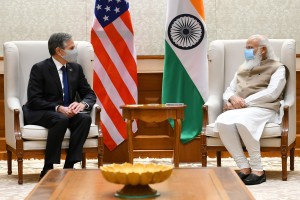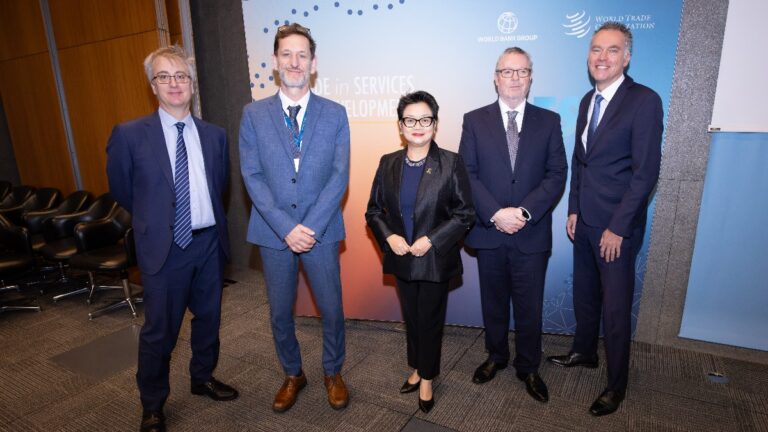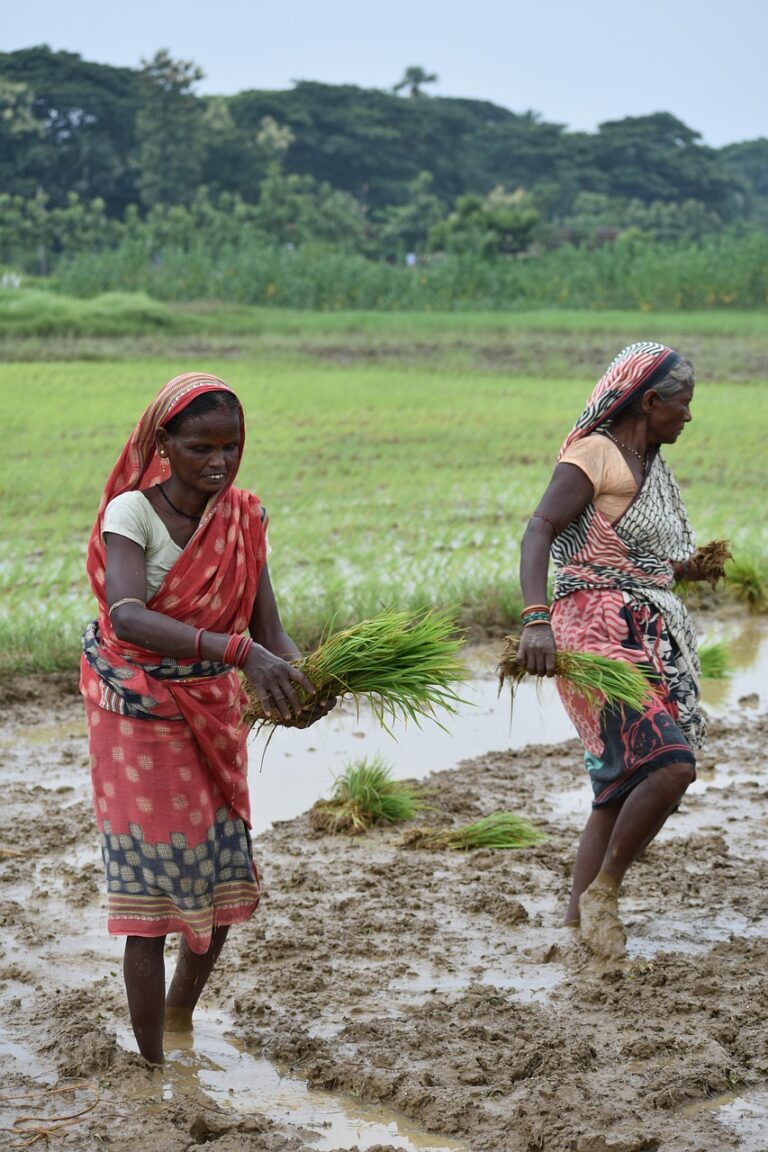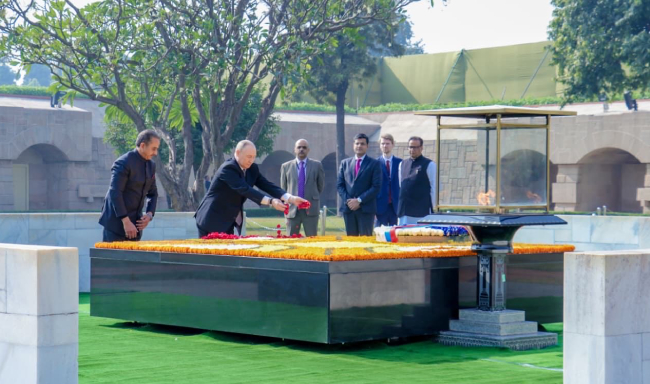
The U.S. Secretary of State, Antony Blinken calling on the Prime Minister, Narendra Modi, in New Delhi on July 28, 2021
US to send an additional $25 million to support vaccination efforts across India
New Delhi: Prime Minister Narendra Modi told the visiting U.S. Secretary of State Antony Blinken, who called on the PM earlier today that the India-US Strategic Partnership will be of even greater global significance in the coming years, in the context of the challenges posed by COVID-19, global economic recovery and climate change.
Modi conveyed his greetings to US President Joe Biden and Vice President Harris and his appreciation for the initiatives taken by President Biden including those related to the Quad, COVID-19 and Climate Change. He said that the societies of US and India share a deep commitment to the values of democracy, freedom and liberty, and the Indian diaspora in the US has contributed immensely to the enhancement of bilateral ties.
Blinken during the interaction with Modi, expressed strong commitment to further deepen India US strategic relations in various sectors including defence, maritime security, trade and investment, climate change and science and technology. While conveying greetings of President Joe Biden and Vice President Kamla Harris to the Prime Minister, he appreciated the increasing convergence between India and US on a wide range of bilateral and multilateral issues, and the commitment of both strategic partners to convert this convergence into concrete and practical cooperation.
Also read: US says Blinken’s visit will reaffirm the commitment to strengthening its partnership with India
Earlier, during a joint press conference along with Indian External Affairs Minister Dr. S. Jaishankar after their meeting, Blinken said President Biden feels a deep personal commitment to making the friendship with India as strong and as effective as it can be. “We believe this partnership will be critical for delivering stability and prosperity in the Indo-Pacific region and beyond, and for showing the world how democracies can deliver for their people. And we believe that there’s a good deal that we can accomplish together on so many fronts, including in the near term,” Blinken said.
On Afghanistan, Blinken said both India and the US were committed to the proposition that there was no military solution to the conflict that afflicts Afghanistan. “There has to be a peaceful resolution which requires the Taliban and the Afghan Government to come to the table, and we both agree, I think strongly, that any future government in Afghanistan has to be inclusive and fully representative of the Afghan people. But ultimately, this has to be an Afghan-led and Afghan-owned peace process that we will all support,” he said. He further found it “accurate” to say that there is largely agreement among most countries, both neighbouring Afghanistan and in the region, on rejection of the proposition that military force is the way to define the future of the country.He emphasized that even if the US withdraws its forces from Afghanistan and NATO and others withdraw their forces, “we remain very much engaged in Afghanistan. We have not only a strong embassy there, but also important programs that continue to support Afghanistan economically, through development assistance, through security assistance. That remains. And we are very much engaged in the diplomacy of working to bring the parties together at the table for a peaceful resolution of the conflict”.
Jaishankar said among the many issues that they looked at, he would specifically note Afghanistan, the Indo-Pacific and the Gulf. Regarding Afghanistan, he said, it is essential that peace negotiations are taken seriously by all parties. “The world wishes to see an independent, sovereign, democratic and stable Afghanistan at peace with itself and with its neighbours but its independence and sovereignty will only be ensured if it is free from malign influences. Similarly unilateral imposition of will by any party will obviously not be democratic and can never lead to stability nor indeed can such efforts ever acquire legitimacy. The gains to Afghan Civil Society especially on the rights of women, minorities and on social freedoms over the last two decades are self evident; we must collectively work to preserve them,” he said. He stressed that Afghanistan must neither be home to terrorism nor resource of refugees. Referring to the Indo Pacific, Jaishankar said it presents a different set of challenges to stability, growth and prosperity. He further informed that the two had also spoken at length about regional concerns, multilateral institutions and global issues, the expanding Indian footprint, be it in Africa, South-east Asia, Caribbean or the South-Pacific.
To a specific question on Indo-Pacific and the Quad, that China doesn’t lose any opportunity to criticise both these concepts, Blinken said, Quad was not is a military alliance but its purpose was “just to advance cooperation on regional challenges while reinforcing international rules and values that we believe, together, underpin peace, prosperity, and stability in the region”. He elaborated: “What the Quad is, is actually quite simple, but as important as it is simple. For likeminded countries – India, the United States, Japan, Australia – coming together to work collectively on some of the most important issues of our time that are going to have a real impact on the lives of our people, and to do it in a way that hopefully ensures a free and open Indo-Pacific region and peace, security, and prosperity for the people of that region.”
Offering an “Indian perspective, Jaishankar said in a globalized world today, India has interests far beyond its immediate borders. “Okay. Certainly, we have interests in the Indian Ocean, in the Pacific Ocean, in the Indo-Pacific. Our major trade partners are there, our major trade routes are there, our political partners are there. We are a big community. And just on any parameter you use, it’s very visible that India has interests in the Indo-Pacific…Now, for groups of countries to work together is not strange. This is the history of international relations. Groups of countries work together, whether in the same in the region – different – you have regional cooperation, or they sometimes work together even in the confined intersections of interests. The Brits is one such example.
So I think the – people need to get over the idea that somehow other countries doing things is debited against them. I think countries do things for what are in their interests for their good and for the good of the world…”
The two discussed a number of critical issues today, COVID-19 being at the top of the agenda. “We remember with gratitude and we will not soon forget the aid and assistance that India provided to us in the early days of COVID-19 when our hospitals were overwhelmed early in the pandemic,” Blinken said and said he was proud that “we could help return the gesture of friendship”. He pointed out that over the past few months, the United States Government had contributed more than $200 million to India for COVID-19 relief. He announced that the United States Government will send an additional $25 million to support vaccination efforts across India. “This funding will contribute, I think, to saving lives by strengthening vaccine supply chain logistics, addressing misinformation and vaccine hesitancy, and helping to train more health care workers,” he said.
“We also have to address the very painful secondary consequences of the pandemic,” he said and added that to fuel the economic recovery, India and the United States must continue to grow our trade relationship, and beyond that we have to keep working through the barriers that stand in the way of greater bilateral investment and deeper commercial ties. “That’s something we talked about today as well. If we create the right conditions from more trade and investment and innovation, there really is no limit to what our private sectors can achieve together,” he said.
Both Jaishankar and Blinken also discussed strengthening their regional cooperation, both bilaterally and through the Quad with Japan and Australia as well as other multilateral partnerships. “We share a vision – India and the United States – of a free, open, secure, and prosperous Indo-Pacific. We’ll work together to make that vision a reality,” he said.
The two also discussed regional security issues, including Afghanistan. Blinken said India and the United States share a strong interest in a peaceful, secure, and stable Afghanistan. According to him, as a leader and critical partner in the region, India has made and will continue to make vital contributions to Afghanistan’s stability and development, “and we’ll continue to work together to sustain the gains of the Afghan people and support regional stability after the withdrawal of Coalition forces from the country”.
Blinken also raised the issue of climate change and pointed out that both India and the US were the two largest carbon emitters. “At a time of rising temperatures and sea levels, we – two of the world’s largest carbon emitters – are on the front lines of the climate crisis and the leading edge of a new green economy. Our countries know firsthand the lethal consequences of climate change,” he said. He also referred to the the U.S.-India Climate and Clean Energy Agenda 2030 Partnership, which was launched earlier this year to help achieve the ambitious 2030 targets: for the United States, slashing greenhouse gas emissions in half, for India, installing 450 gigawatts of renewable energy capacity among other targets. “That’s nearly twice the amount of renewable energy capacity that the entire world added in 2020. It would demonstrate to emerging economies that economic development and a cleaner economy go hand in hand,” he said.
Sharing an anectode, Blinken said that when in 2006, then-Senator Joe Biden was in India when he had said: “My dream is that in 2020 the two closest nations in the world will be India and the United States. If that occurs, the world will be safer.”
Well, it’s 2021, Blinken said, adding that Joe Biden is President of the United States; the friendship between India and the United States is one of the most consequential in the world. “And we, too, look to the future, to 2030 and beyond, because once again, the choices and investments that we make today can produce a healthier, more peaceful, more prosperous, more democratic future for our children and for the world. That’s the opportunity before us, and that’s what the people of India and the United States will work together to achieve,” he said.
– global bihari bureau






Good👌 news